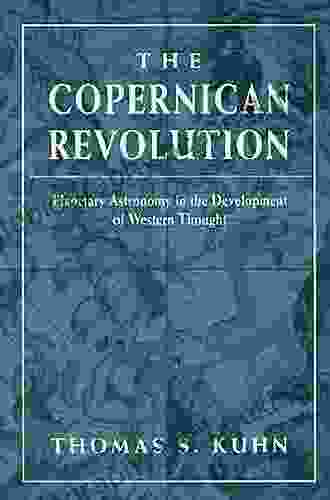Planetary Astronomy in the Development of Western Thought: A Journey through the Cosmos and the Human Mind

The study of the cosmos has played a profound role in the development of Western thought, from the earliest civilizations to the present day. Planetary astronomy, the study of the planets, moons, and other celestial bodies within our solar system, has been a particularly important area of scientific inquiry, providing insights into the nature of the universe and our place within it.
4.6 out of 5
| Language | : | English |
| File size | : | 1637 KB |
| Text-to-Speech | : | Enabled |
| Screen Reader | : | Supported |
| Enhanced typesetting | : | Enabled |
| Word Wise | : | Enabled |
| Print length | : | 249 pages |
In his seminal work, Planetary Astronomy in the Development of Western Thought, historian of science David C. Lindberg traces the evolution of astronomical understanding from ancient times to the present day. Lindberg explores the impact of astronomical observations on religious beliefs, philosophical thought, and scientific understanding. He argues that the development of planetary astronomy has been a key factor in the rise of science and the emergence of the modern world.
Lindberg begins his book by examining the astronomical beliefs of the ancient Greeks. The Greeks believed that the Earth was the center of the universe and that the planets and stars moved in perfect circles around it. This geocentric model of the universe was widely accepted for centuries, but it began to be challenged in the 16th century by the Polish astronomer Nicolaus Copernicus.
Copernicus proposed that the Sun, not the Earth, was the center of the solar system. This heliocentric model of the universe was initially met with resistance from the Catholic Church, but it eventually gained acceptance. The heliocentric model revolutionized our understanding of the universe and paved the way for the development of modern science.
In the centuries that followed Copernicus, astronomers made great strides in understanding the solar system. Galileo Galilei used a telescope to observe the moons of Jupiter, providing evidence for the heliocentric model. Johannes Kepler discovered the laws of planetary motion, which described the elliptical orbits of the planets around the Sun. And Isaac Newton developed the laws of gravity, which explained the motion of the planets and other celestial bodies.
The development of planetary astronomy has had a profound impact on Western thought. It has led to a greater understanding of the universe and our place within it. It has also challenged our religious beliefs and philosophical assumptions. Planetary astronomy is a fascinating and ever-evolving field of study that continues to provide insights into the nature of reality.
The Impact of Planetary Astronomy on Religious Beliefs
The development of planetary astronomy has had a significant impact on religious beliefs. In ancient times, many people believed that the Earth was the center of the universe and that the planets and stars were created to serve humans. This geocentric view of the universe was supported by religious texts and traditions. However, as astronomers began to learn more about the solar system, it became increasingly difficult to maintain this view.
The heliocentric model of the universe, which placed the Sun at the center, was a major challenge to religious beliefs. Many people believed that this model was incompatible with the teachings of the Bible and other religious texts. The Catholic Church even condemned the heliocentric model as heresy.
However, over time, the heliocentric model gained acceptance. This was due in part to the work of scientists such as Galileo Galilei, who provided evidence for the heliocentric model. It was also due to the work of religious thinkers such as Thomas Aquinas, who argued that the heliocentric model could be reconciled with the teachings of the Bible.
The development of planetary astronomy has led to a greater understanding of the universe and our place within it. This has challenged some religious beliefs, but it has also led to a deeper understanding of God's creation.
The Impact of Planetary Astronomy on Philosophical Thought
The development of planetary astronomy has also had a significant impact on philosophical thought. In ancient times, many philosophers believed that the universe was eternal and unchanging. This view was based on the observation that the planets and stars appeared to move in perfect circles around the Earth. However, as astronomers began to learn more about the solar system, it became clear that the universe was not eternal and unchanging.
The heliocentric model of the universe was a major challenge to the philosophical view of the universe as eternal and unchanging. This model suggested that the universe was dynamic and evolving. This view was supported by the work of scientists such as Nicolaus Copernicus and Johannes Kepler, who discovered the laws of planetary motion.
The development of planetary astronomy has led to a greater understanding of the universe and our place within it. This has challenged some philosophical assumptions, but it has also led to a deeper understanding of the nature of reality.
The Impact of Planetary Astronomy on Scientific Understanding
The development of planetary astronomy has had a profound impact on scientific understanding. In ancient times, there was no clear distinction between science and philosophy. However, as astronomers began to make more accurate observations of the solar system, it became clear that the universe could be understood through the use of scientific methods.
The heliocentric model of the universe was a major breakthrough in scientific understanding. This model provided a more accurate description of the solar system than the geocentric model. It also paved the way for the development of new scientific theories, such as the laws of motion and the laws of gravity.
The development of planetary astronomy has led to a greater understanding of the universe and our place within it. This has revolutionized our understanding of the natural world and has led to the development of new technologies. Planetary astronomy is a fascinating and ever-evolving field of study that continues to provide insights into the nature of reality.
Planetary astronomy has played a profound role in the development of Western thought. It has led to a greater understanding of the universe and our place within it. It has also challenged our religious beliefs, philosophical assumptions, and scientific understanding.
Planetary astronomy is a fascinating and ever-evolving field of study that continues to provide insights into the nature of reality. It is a testament to the human spirit of inquiry and our quest for knowledge.
4.6 out of 5
| Language | : | English |
| File size | : | 1637 KB |
| Text-to-Speech | : | Enabled |
| Screen Reader | : | Supported |
| Enhanced typesetting | : | Enabled |
| Word Wise | : | Enabled |
| Print length | : | 249 pages |
Do you want to contribute by writing guest posts on this blog?
Please contact us and send us a resume of previous articles that you have written.
 Book
Book Novel
Novel Page
Page Chapter
Chapter Text
Text Story
Story Genre
Genre Reader
Reader Library
Library Paperback
Paperback E-book
E-book Magazine
Magazine Newspaper
Newspaper Paragraph
Paragraph Sentence
Sentence Bookmark
Bookmark Shelf
Shelf Glossary
Glossary Bibliography
Bibliography Foreword
Foreword Preface
Preface Synopsis
Synopsis Annotation
Annotation Footnote
Footnote Manuscript
Manuscript Scroll
Scroll Codex
Codex Tome
Tome Bestseller
Bestseller Classics
Classics Library card
Library card Narrative
Narrative Biography
Biography Autobiography
Autobiography Memoir
Memoir Reference
Reference Encyclopedia
Encyclopedia Benjamin Graham
Benjamin Graham Bennett Cerf
Bennett Cerf Barry King
Barry King Bola Sokunbi
Bola Sokunbi Bonnie Gillespie
Bonnie Gillespie Benjamin P Bowser
Benjamin P Bowser Bill Plympton
Bill Plympton Brad Schoenfeld
Brad Schoenfeld Bookrags Com
Bookrags Com Bjk Brown
Bjk Brown Barry Hatton
Barry Hatton Benjamin Dreyer
Benjamin Dreyer Beth A Grosshans
Beth A Grosshans Bill Streever
Bill Streever Barbara Scott
Barbara Scott Ben Emmens
Ben Emmens Beverley Birch
Beverley Birch Ben Malisow
Ben Malisow Brandon Royal
Brandon Royal Bobbie Merrill
Bobbie Merrill
Light bulbAdvertise smarter! Our strategic ad space ensures maximum exposure. Reserve your spot today!

 Robert Louis StevensonThe Ultimate Guide to Patents in Commerce: Unlocking Innovation and Driving...
Robert Louis StevensonThe Ultimate Guide to Patents in Commerce: Unlocking Innovation and Driving... Rex HayesFollow ·3.9k
Rex HayesFollow ·3.9k Marc FosterFollow ·18.7k
Marc FosterFollow ·18.7k Benjamin StoneFollow ·12.1k
Benjamin StoneFollow ·12.1k Jim CoxFollow ·11.7k
Jim CoxFollow ·11.7k Terry BellFollow ·17k
Terry BellFollow ·17k Stephen KingFollow ·17.2k
Stephen KingFollow ·17.2k Brian WestFollow ·16.9k
Brian WestFollow ·16.9k Anthony BurgessFollow ·10.7k
Anthony BurgessFollow ·10.7k

 Alex Foster
Alex FosterRediscover the Old Testament with a Captivating Graphic...
Prepare to embark on an extraordinary...

 Ross Nelson
Ross NelsonThe Christmas Story: The Brick Bible for Kids
LEGO® Bricks Meet the...

 Anton Chekhov
Anton ChekhovUnveiling the Hidden History: The Brick Chronicle of...
In the annals of American history, the...

 Blake Bell
Blake BellOptions Trading Crash Course: A Comprehensive Guide to...
In the fast-paced and...

 Percy Bysshe Shelley
Percy Bysshe ShelleyUnlock Your Artistic Potential with "The Practical...
The Indispensable Handbook for...
4.6 out of 5
| Language | : | English |
| File size | : | 1637 KB |
| Text-to-Speech | : | Enabled |
| Screen Reader | : | Supported |
| Enhanced typesetting | : | Enabled |
| Word Wise | : | Enabled |
| Print length | : | 249 pages |












